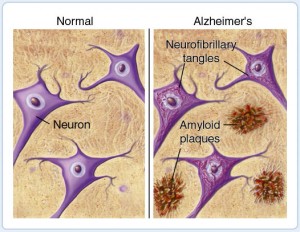Lifelong cognitive exercise may ward off Alzheimer’s protein beta amyloid

Very significant findings reported today. Keeping brain sharp may ward off Alzheimer’s protein (Reuters):
“People who challenge their brains throughout their lifetimes — through reading, writing and playing games — are less likely to develop protein deposits in the brain linked with Alzheimer’s, researchers said on Monday.”
“Prior studies have suggested that people who are well educated and stay mentally active build up brain reserves that allow them to stay sharp even if deposits of the destructive protein called beta amyloid form in the brain.”
“But the latest study, based on brain-imaging research, suggests that people who stay mentally engaged beginning in childhood and remain so throughout their lives actually develop fewer amyloid plaques.” (Editor’s note: emphasis added)
“She said amyloid probably starts accumulating many years before symptoms appear, so by the time memory problems start, there is little that can be done. “The time for intervention may be much sooner,” she said in a statement.”
Pic source: American Health Assistance Foundation.
Study: Association of Lifetime Cognitive Engagement and Low ?-Amyloid Deposition (Archives of Neurology)
- Main Outcome Measures Cortical [11C]PiB average (frontal, parietal, lateral temporal, and cingulate regions) and retrospective, self-report scales assessing participation in cognitive activities (eg, reading, writing, and playing games) and physical exercise.
- Results Greater participation in cognitively stimulating activities across the lifespan, but particularly in early and middle life, was associated with reduced [11C]PiB uptake (P < .001, accounting for age, sex, and years of education). Older participants in the highest cognitive activity tertile had [11C]PiB uptake comparable to young controls, whereas those in the lowest cognitive activity tertile had [11C]PiB uptake comparable to patients with AD. Although greater cognitive activity was associated with greater physical exercise, exercise was not associated with [11C]PiB uptake.
- Conclusions Individuals with greater early- and middle- life cognitive activity had lower [11C]PiB uptake. The tendency to participate in cognitively stimulating activities is likely related to engagement in a variety of lifestyle practices that have been implicated in other studies showing reduced risk of AD-related pathology. We report a direct association between cognitive activity and [11C]PiB uptake, suggesting that lifestyle factors found in individuals with high cognitive engagement may prevent or slow deposition of ?-amyloid, perhaps influencing the onset and progression of AD.
Related resources to learn more:


